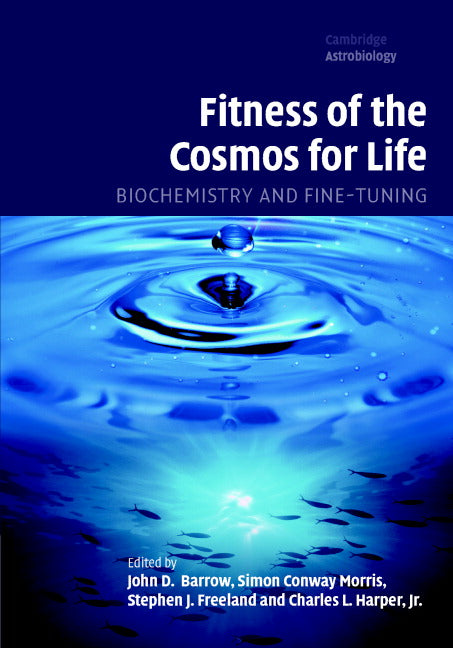Freshly Printed - allow 6 days lead
Couldn't load pickup availability
Fitness of the Cosmos for Life
Biochemistry and Fine-Tuning
An interdisciplinary book for scientists interested in the origin and existence of life in our universe, first published in 2007.
John D. Barrow (Edited by), Simon Conway Morris (Edited by), Stephen J. Freeland (Edited by), Charles L. Harper, Jr (Edited by)
9780521871020, Cambridge University Press
Hardback, published 6 December 2007
526 pages
24.4 x 17 x 2.9 cm, 1.17 kg
Review of the hardback: '… comprehensive … well referenced, and adequately indexed. … I would … recommend it to readers who are neither scientists, nor academics, nor theologians.' The Observatory
This highly interdisciplinary 2007 book highlights many of the ways in which chemistry plays a crucial role in making life an evolutionary possibility in the universe. Cosmologists and particle physicists have often explored how the observed laws and constants of nature lie within a narrow range that allows complexity and life to evolve and adapt. Here, these anthropic considerations are diversified in a host of new ways to identify the most sensitive features of biochemistry and astrobiology. Celebrating the classic 1913 work of Lawrence J. Henderson, The Fitness of the Environment for Life, this book looks at the delicate balance between chemistry and the ambient conditions in the universe that permit complex chemical networks and structures to exist. It will appeal to a broad range of scientists, academics, and others interested in the origin and existence of life in our universe.
Foreword: The improbability of life George M. Whitesides
Part I. The Fitness of 'Fitness' - Henderson in Context: 1. Locating 'fitness' and Lawrence J. Henderson Everett Mendelsohn
2. Revisiting The Fitness of the Environment Owen Gingerich
3. Is fine-tuning remarkable? John F. Haught
4. Complexity in context: the metaphysical implications of evolutionary theory Edward T. Oakes
5. Tuning fine-tuning Ernan Mcmullin
Part II. The Fitness of the Cosmic Environment: 6. Fitness and the cosmic environment Paul C. W. Davies
7. The interconnections between cosmology and life Mario Livio
8. Chemistry and sensitivity John D. Barrow
9. Fitness of the cosmos for the origin and evolution of life: from biochemical fine-tuning to the Anthropic Principle Julian Chela-Flores
Part III. The Fitness of the Terrestrial Environment: 10. How biofriendly is the universe? Christian de Duve
11. Tuning into the frequencies of life: a roar of static or a precise signal? Simon Conway Morris
12. Life on earth: the role of proteins Jayanth R. Banavar and Amos Maritan
13. Protein-based life as an emergent property of matter: the nature and biological fitness of the protein folds Michael J. Denton
14. Could an intelligent alien predict earth's biochemistry? Stephen J. Freeland
15. Would Venus evolve on Mars? Bioenergetic constraints, allometric trends, and the evolution of life-history invariants Jeffrey P. Schloss
Part IV. The Fitness of the Chemical Environment: 16. Creating a perspective for comparing Albert Eschenmoser
17. Fine-tuning and interstellar chemistry William Klemperer
18. Framing the question of fine-tuning for intermediary metabolism Eric Smith and Harold J. Morowitz
19. Coarse-tuning the origin of life? Guy Ourisson
20. Plausible lipid-like peptides: prebiotic molecular self-assembly in water Shuguang Zhang
21. Evolution revisited by inorganic chemists R. J. P. Williams and J. J. R. Fraústo da Silva
Index.
Subject Areas: Molecular biology [PSD], Evolution [PSAJ], Cosmology & the universe [PGK], Astronomy, space & time [PG]


